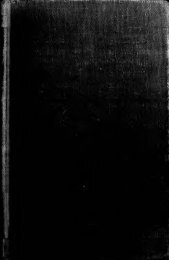Ecclesiastes - GA Barton - 1908.pdf
Ecclesiastes - GA Barton - 1908.pdf
Ecclesiastes - GA Barton - 1908.pdf
Create successful ePaper yourself
Turn your PDF publications into a flip-book with our unique Google optimized e-Paper software.
PRAISE OF QOHELETH [Cn. 12- 199<br />
This is, perhaps, suggested by Qoheleth's own words<br />
of the flesh}.<br />
in i 18 . The editor would deter his pupil from unorthodox or<br />
heathen literature by the thought of the weariness of study.<br />
13 a . End of discourse], the end of the book. All has been heard}.<br />
These words probably formed the conclusion of the editor's<br />
work, and once formed the end of the book.<br />
13 b . Fear God and keep his commandments}. These begin the<br />
Chasid glossator's final addition. It is in harmony with his previous<br />
insertions, cf. 3 17 8 8 n 9b . This is every man}. A Hebrew<br />
metaphorical way of saying, "this is what every man is destined<br />
for and should be wholly absorbed in." For parallels, see crit.<br />
note. 14. For every work God will bring into the judgment concern-<br />
ing every secret thing]. This echoes the words of the Chasid in 1 1 .<br />
With this note of judgment the book, as the Chasid left it, closes.<br />
The Massorets thought the ending too harsh, and accordingly re-<br />
peated vs. 13 after it, to make the book close with a more pleasant<br />
thought. They made similar repetitions at the end of Isaiah,<br />
the Minor Prophets and Lamentations.<br />
12 9 . in>] was taken by Heil., Z6. and Dale to mean "as to the rest,"<br />
or "it remains" (to speak of). The word is, however, an adv. as in<br />
2 is<br />
716. jn those passages it means "excessively," here, "besides,"<br />
cf. 5DB. 45 2b. This approaches the Mishnic meaning of "additional,"<br />
given to a kindred 1<br />
form, see Ja. 6o5a. ID ?] Piel with causative force<br />
of nnV= "to learn," cf. BD. It takes two objects, cf. Ko. 327^ oyn].<br />
(6, A, read DINH, which Gr. 5<br />
preferred. ft ?] was connected by the Ver-<br />
sions with f;.N = "ear," either as noun or verb. It is in reality the only<br />
survival in BH. of fTN="to weigh" (cf. Ar. wazari), from which comes<br />
O' IJ?ND=" scales." Here it seems to mean "weigh"<br />
"test" (cf. Ges. Bu -<br />
in the sense of<br />
p. 23a and DB. 24b). -ij5n]="to search out,"<br />
occurs in Piel only here. Zap. would erase it on metrical grounds as a<br />
gl. fiP.ri] is used by Q. only in the sense of "making straight the<br />
crooked," cf.<br />
15<br />
i 7 13 . Here it means "set in order," "arranged," as in<br />
the Targ. and Tal. (cf. Ja. 1692). This difference from the usage of<br />
Qoheleth confirms our suspicion that the verse is from a later editor.<br />
nain], on the use of this word with nouns, see Ko. 3i8e. (6 takes<br />





